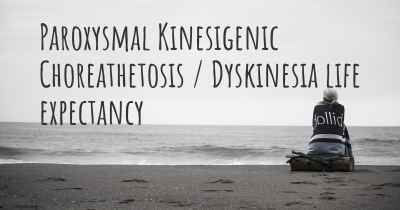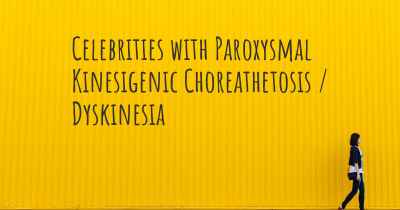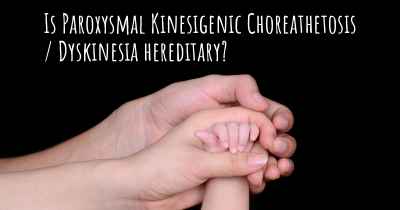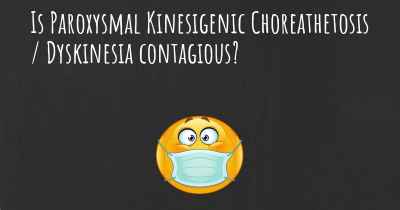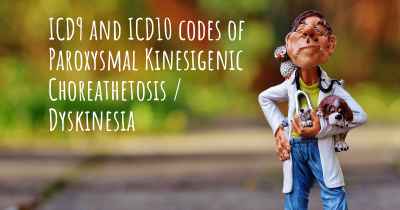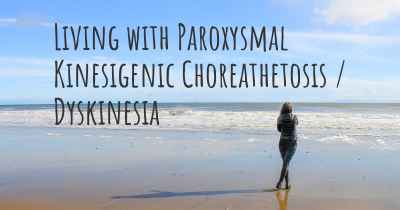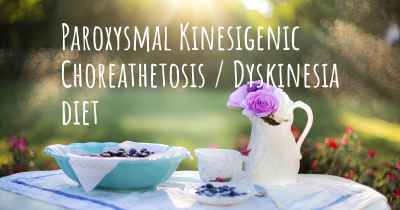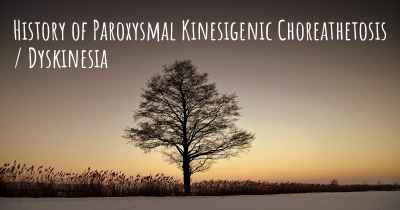Is there any natural treatment for Paroxysmal Kinesigenic Choreathetosis / Dyskinesia?
Are there natural treatment(s) that may improve the quality of life of people with Paroxysmal Kinesigenic Choreathetosis / Dyskinesia? Here you can see if there is any natural remedy and/or treatment that can help people with Paroxysmal Kinesigenic Choreathetosis / Dyskinesia

Is there any natural treatment for Paroxysmal Kinesigenic Choreathetosis / Dyskinesia?
Paroxysmal Kinesigenic Choreathetosis/Dyskinesia (PKC/D) is a rare neurological disorder characterized by sudden, brief, and involuntary movements. While there is no known cure for PKC/D, there are several natural treatment options that can help manage the symptoms and improve the quality of life for individuals with this condition.
1. Lifestyle Modifications
Adopting certain lifestyle modifications can be beneficial in managing PKC/D:
- Regular Exercise: Engaging in regular physical activity can help reduce the frequency and severity of PKC/D episodes. Low-impact exercises such as yoga, tai chi, and swimming may be particularly helpful.
- Stress Management: Stress and anxiety can trigger PKC/D episodes. Practicing relaxation techniques like deep breathing exercises, meditation, and mindfulness can help reduce stress levels and minimize the occurrence of symptoms.
- Adequate Sleep: Getting enough sleep is crucial for overall well-being and can help manage PKC/D symptoms. Establishing a regular sleep routine and creating a comfortable sleep environment can promote better sleep quality.
- Healthy Diet: A well-balanced diet rich in fruits, vegetables, whole grains, and lean proteins can support overall health and potentially alleviate PKC/D symptoms. Avoiding excessive caffeine and alcohol intake is also recommended.
2. Herbal Remedies
Several herbal remedies have been traditionally used to manage neurological conditions and may provide some relief for PKC/D:
- Passionflower: Passionflower is known for its calming properties and may help reduce anxiety and muscle spasms associated with PKC/D. It can be consumed as a tea or taken in supplement form.
- Valerian Root: Valerian root has sedative effects and may aid in reducing the frequency and intensity of PKC/D episodes. It is commonly available as a supplement or in tea form.
- Kava: Kava is a plant native to the South Pacific and has been used for its anxiolytic properties. It may help alleviate anxiety and muscle tension associated with PKC/D. However, it should be used with caution and under the guidance of a healthcare professional due to potential side effects.
- Skullcap: Skullcap is an herb that has been traditionally used to treat various neurological conditions. It may have antispasmodic and sedative effects, potentially reducing PKC/D symptoms. Skullcap can be consumed as a tea or taken in supplement form.
3. Acupuncture
Acupuncture, a traditional Chinese medicine practice, involves the insertion of thin needles into specific points on the body. It is believed to restore the flow of energy and promote overall well-being. Acupuncture has been reported to provide relief for various movement disorders, including PKC/D. However, it is essential to consult a qualified acupuncturist experienced in treating neurological conditions.
4. Physical Therapy
Physical therapy can be beneficial in managing PKC/D symptoms and improving motor control. A physical therapist can design a personalized exercise program to strengthen muscles, improve coordination, and enhance overall mobility. They may also teach relaxation techniques and provide guidance on managing symptoms during episodes.
5. Supportive Therapies
Engaging in supportive therapies can help individuals cope with the emotional and psychological impact of PKC/D:
- Counseling: Seeking counseling or therapy can provide emotional support and help individuals develop coping strategies to manage the challenges associated with PKC/D.
- Support Groups: Joining support groups or connecting with others who have similar experiences can provide a sense of community and understanding. Sharing experiences, tips, and advice can be invaluable in managing PKC/D.
It is important to note that while these natural treatments may help alleviate PKC/D symptoms, they should not replace medical advice or prescribed medications. It is always recommended to consult with a healthcare professional before starting any new treatment regimen.
